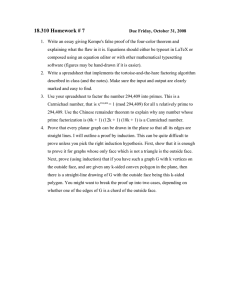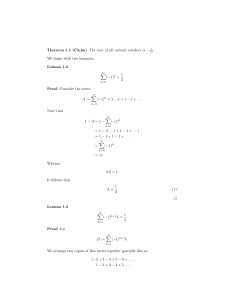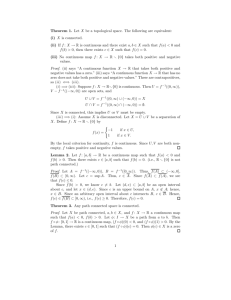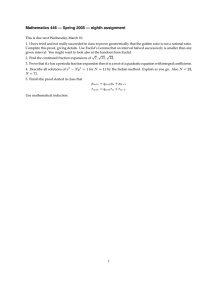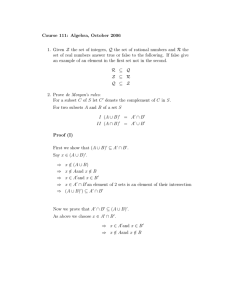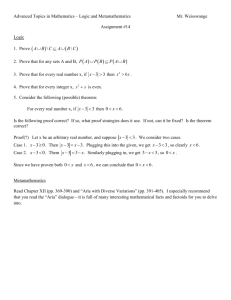Math 3210-3 HW 7 The Natural Numbers and Induction
advertisement
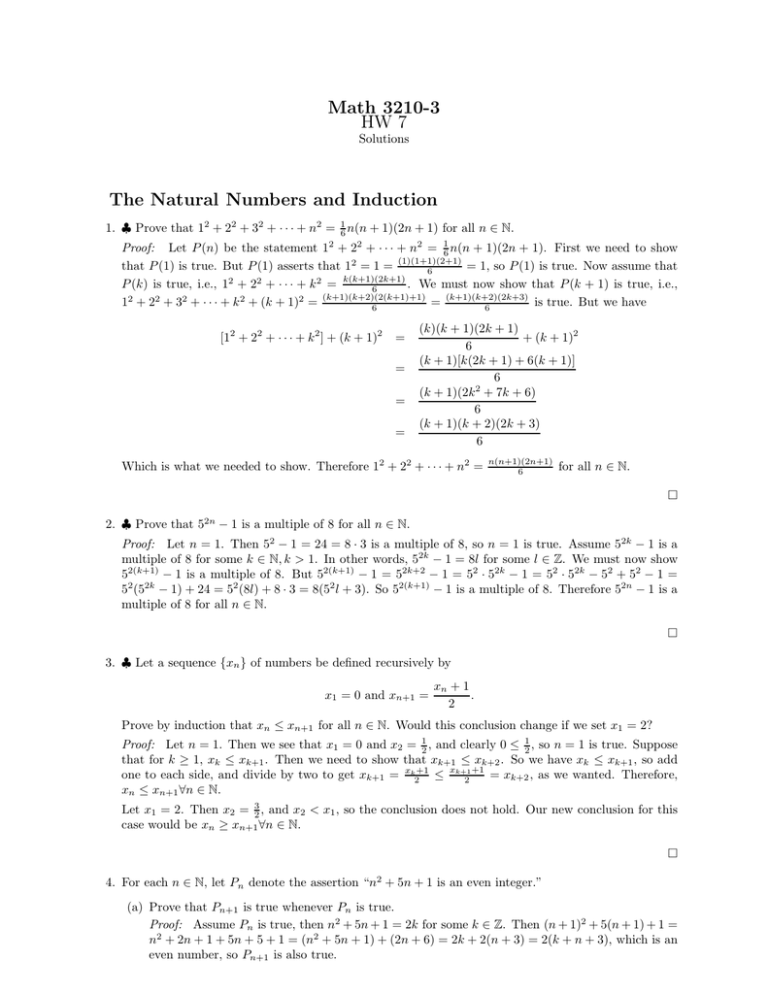
Math 3210-3
HW 7
Solutions
The Natural Numbers and Induction
1. ♣ Prove that 12 + 22 + 32 + · · · + n2 = 16 n(n + 1)(2n + 1) for all n ∈ N.
Proof: Let P (n) be the statement 12 + 22 + · · · + n2 = 16 n(n + 1)(2n + 1). First we need to show
that P (1) is true. But P (1) asserts that 12 = 1 = (1)(1+1)(2+1)
= 1, so P (1) is true. Now assume that
6
k(k+1)(2k+1)
2
2
2
. We must now show that P (k + 1) is true, i.e.,
P (k) is true, i.e., 1 + 2 + · · · + k =
6
(k+1)(k+2)(2(k+1)+1)
2
2
2
2
2
1 + 2 + 3 + · · · + k + (k + 1) =
= (k+1)(k+2)(2k+3)
is true. But we have
6
6
[12 + 22 + · · · + k 2 ] + (k + 1)2
=
=
=
=
(k)(k + 1)(2k + 1)
+ (k + 1)2
6
(k + 1)[k(2k + 1) + 6(k + 1)]
6
2
(k + 1)(2k + 7k + 6)
6
(k + 1)(k + 2)(2k + 3)
6
Which is what we needed to show. Therefore 12 + 22 + · · · + n2 =
n(n+1)(2n+1)
6
for all n ∈ N.
˜
2. ♣ Prove that 52n − 1 is a multiple of 8 for all n ∈ N.
Proof: Let n = 1. Then 52 − 1 = 24 = 8 · 3 is a multiple of 8, so n = 1 is true. Assume 52k − 1 is a
multiple of 8 for some k ∈ N, k > 1. In other words, 52k − 1 = 8l for some l ∈ Z. We must now show
52(k+1) − 1 is a multiple of 8. But 52(k+1) − 1 = 52k+2 − 1 = 52 · 52k − 1 = 52 · 52k − 52 + 52 − 1 =
52 (52k − 1) + 24 = 52 (8l) + 8 · 3 = 8(52 l + 3). So 52(k+1) − 1 is a multiple of 8. Therefore 52n − 1 is a
multiple of 8 for all n ∈ N.
˜
3. ♣ Let a sequence {xn } of numbers be defined recursively by
x1 = 0 and xn+1 =
xn + 1
.
2
Prove by induction that xn ≤ xn+1 for all n ∈ N. Would this conclusion change if we set x1 = 2?
Proof: Let n = 1. Then we see that x1 = 0 and x2 = 12 , and clearly 0 ≤ 21 , so n = 1 is true. Suppose
that for k ≥ 1, xk ≤ xk+1 . Then we need to show that xk+1 ≤ xk+2 . So we have xk ≤ xk+1 , so add
+1
= xk+2 , as we wanted. Therefore,
one to each side, and divide by two to get xk+1 = xk2+1 ≤ xk+1
2
xn ≤ xn+1 ∀n ∈ N.
Let x1 = 2. Then x2 = 23 , and x2 < x1 , so the conclusion does not hold. Our new conclusion for this
case would be xn ≥ xn+1 ∀n ∈ N.
˜
4. For each n ∈ N, let Pn denote the assertion “n2 + 5n + 1 is an even integer.”
(a) Prove that Pn+1 is true whenever Pn is true.
Proof: Assume Pn is true, then n2 + 5n + 1 = 2k for some k ∈ Z. Then (n + 1)2 + 5(n + 1) + 1 =
n2 + 2n + 1 + 5n + 5 + 1 = (n2 + 5n + 1) + (2n + 6) = 2k + 2(n + 3) = 2(k + n + 3), which is an
even number, so Pn+1 is also true.
˜
(b) For which n is Pn actually true? What is the moral of this exercise?
Proof: I claim that n2 + 5n + 1 is odd for all n ∈ N. If n = 1, then we have 1 + 5 + 1 = 7, so
n = 1 is true. Now suppose k 2 + 5k + 1 = 2m − 1 for some m ∈ Z. Then (k + 1)2 + 5(k + 1) + 1 =
(2m − 1) + 2(n + 3) = 2m + 2n + 5 = 2(m + k + 3) − 1 which is odd. So Pn is true for all n ∈ N.
The moral of this exercise is to show that it is necessary to verify Pn for the base case.
˜
5. ♣ Use Theorem 24 to prove that n2 < 2n for all n ≥ 5.
Proof: By Theorem 24, we need to show n = 5 is true, and when n = k is true, then n = k + 1 is
also true. Let n = 5. Then 52 = 25 < 32 = 25 , so n = 5 is true. Assume k 2 < 2k for some k ≥ 5.
Then (k + 1)2 = k 2 + 2k + 1 < 2k + 2k + 1. If we can show that 2k + 1 < 2k , then we will have
(k + 1)2 < 2k + 2k = 2k+1 . Then we can conclude that n2 < 2n for all n ∈ N. We will have this
conclusion when we prove the next lemma.
˜
Lemma 1
2n + 1 < 2n for all n ≥ 5.
Proof: Let n = 5. Then 2(5) + 1 = 11 < 32 = 25 , so n = 5 is true. Assume 2k + 1 < 2k for some k ≥ 5.
Then 2(k +1)+1 = 2k +3 = (2k +1)+2 < 2k +2, and 2 < 2k for k ≥ 5, so 2(k +1)+1 < 2k +2k = 2k+1 .
Therefore 2k + 1 < 2n for all n ≥ 5.
˜
